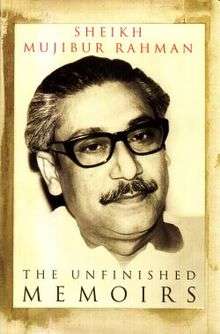The Unfinished Memoirs
 The Cover page of The Unfinished Memoirs | |
| Author | Sheikh Mujibur Rahman |
|---|---|
| Original title | অসমাপ্ত আত্মজীবনী (Asamapta Atmajibanee) |
| Translator | Fakrul Alam |
| Cover artist | Qayyum Chowdhury (the original Bengali version) |
| Country | Bangladesh, India and Pakistan |
| Language | Bengali, English, Chinese and Japanese |
| Genre | Autobiography |
| Publisher | The University Press Limited, Penguin Books and Oxford University Press |
Publication date | June, 2012 |
Published in English | June, 2012 |
| Pages | 323 |
| ISBN | 9789845061100 |
The Unfinished Memoirs (Bengali: অসমাপ্ত আত্মজীবনী) is the autobiography by Sheikh Mujibur Rahman. Inspired by his wife, Fazilatunnesa Mujub, Mujib started writing his autobiography in his notebooks during his sojourns in jail as a state prisoner between 1967 and 1969.[1] Later Mujib gave the notebooks to Moni to prepare a typed copy. But after the assassination of Sheikh Mujib and Sheikh Fazlul Haq Moni, the notebooks slid in oblivion and remained so until one of his relatives discovered four notebooks in a drawer of Sheikh Moni in 2004.[2] By then, the notebooks' pages became discolored and brittle. In his memoirs, Mujib portrayed vividly many aspects of his life in and out of prison. Mujib also narrated the beginning of his ancestry, birth and childhood, days in school and college, and social and political involvements.[3] Mujib also recounted the historical events that he closely observed as a political activist before and after the India partition – famine, communal riots in Kolkata and Bihar, partition, politics of Kolkata-centric State Muslim Student League and Muslim League, Pakistan central government's discriminatory attitude.[4][5] It also chronicles Bengali language movement, the first stirrings of the movement for autonomy and independence, and powerfully conveys the great uncertainties as well as the great hopes that the Bengali nation had at that time. Mujib expressed his views on other prominent leaders of the time, including Maulana Bhashani, Yar Mohammad Khan, Mahatma Gandhi, Muhammad Ali Jinnah, Liaquat Ali Khan, Huseyn Shaheed Suhrawardy, A.K. Fazlul Haq, Abul Hashim, Khawaja Nazimuddin, Ghulam Muhammad, Mohammad Ali Bogra, Chaudhury Muhammad Ali, and Nurul Amin.[6] The last part portrays with the events accompanying the struggle for democratic rights in 1955.
References
- ↑ "The Unfinished Memoirs". Penguin Books India. Retrieved 12 September 2012.
- ↑ "Bangabandhu's autobiography launched". The Independent. Dhaka. 20 June 2012. Retrieved 12 September 2012.
- ↑ "Autobiography launches today". The Daily Star. Dhaka. 18 June 2012. Retrieved 12 September 2012.
- ↑ "Mujib's unfinished autobiography hits stands Monday". bdnews24.com. Dhaka. 17 June 2012. Retrieved 12 September 2012.
- ↑ "Autobiography of Mujibur handed over to Hasina". Gulf Times. 21 June 2012. Retrieved 12 September 2012.
- ↑ "The Oxford Update July - September 2012" (PDF). Oxford University Press. Retrieved 13 September 2012.
External links
- Mohammad A. Quayum, "Glimpses into the making of a national titan," Rev. of The Unfinished Memoirs, The Daily Star, http://archive.thedailystar.net/newDesign/news-details.php?nid=269232.
